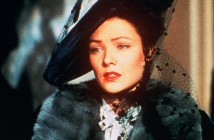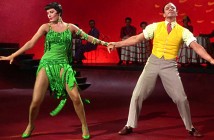
Editor’s Notes: The following article is part of our coverage for TIFF’s Endless Summer – The Birth of the Blockbuster which runs from August 30th to September 1st at TIFF Bell Lightbox. For more information on upcoming TIFF film series visit http://tiff.net and follow TIFF on Twitter at @TIFF_NET.
Back to the Future is a special film. It enjoys universal praise (I have never met a person who disliked BTTF and I honestly never want to) and despite rapidly approaching its 30th anniversary remains eminently relevant. It is a gateway for the science fiction averse, with its humor and grounded story of redemption and love being cloaked in the complications of time travel. While later installments would have us lusting after Nike Mags and craving hoverboards (regardless of the fact that many of us would probably fall on our asses if we actually tried to use them), it was the first film that turned the DeLorean DMC-12 into a piece of Americana. That, in and of itself, is an impressive feat. We could talk for days about the importance of BTTF, its ability to continually captivate and refusal to allow its many references to date it, but perhaps it is more important to delve deeper into the film itself. While Doc and Marty will forever represent BTTF, and be glorified by cosplayers around the globe, it is another character entirely who is of the greatest importance to the film. Jennifer Parker is the key to the McFly family success.
Back to the Future is a special film. It enjoys universal praise (I have never met a person who disliked BTTF and I honestly never want to) and despite rapidly approaching its 30th anniversary remains eminently relevant.
At its core, every entry in the BTTF trilogy is about a specific character exploring and developing some aspect of his personality. While Marty McFly is the central character of the trilogy, it isn’t until the second film that he gets to have his own story. Back to the Future Part II has Marty facing his feelings of inadequacy. He pushes hard against any that think him lesser. Captured additionally in Michael J. Fox’s short stature, he cannot stand to be accused of cowardice, a choice that forever changes his life before he remedies the action in Back to the Future Part III by ignoring the taunts of Needles. In BTTF III, Doc Brown is given a love life. His older age be damned, for once we are shown a softer side of Doc and the lengths that he will go for romantic love. Through the actions of BTTF III, he is allowed to explore his desire for fatherhood, an urge that was hinted at through his close relationship with Marty. But let’s get back to the film at hand. Back to the Future is about George McFly and his transformation from boy to man, from a shuffling pushover to solid decision maker.

The George McFly of the original 1985 is little more than a child. He is bullied by Biff, sits at the dinner table distractingly watching television and has little romantic interest in his own wife. The existence of his not one, but three children is somewhat baffling. When Marty sees his father for the first time in 1955 he is basically seeing the same person. This is one of the many examples of BTTF’s reflective gaze, revealing how without effort, things have the tendency to remain the same. George’s family is like him, directionless and more concerned with wallowing in depression, a maintenance of the status quo, than exceeding in any aspect of life. The complacency is derived from George and his complete lack of confidence. The attitude has even beaten down the once lively Lorraine. As she reminisces on her meeting George, an adoration creeping through her eyes, she is nearly invigorated. However, once George begins to laugh at the television, she is yanked back to her situation and quickly retreats to the bottle. The one exception is Marty, who appears to possess confidence and wit that beguile his family. This is where Jennifer comes in.
Jennifer Parker, before she was reduced to a fainting punchline in BTTF II and III, is a strong female character. She is loyal, determined and confident. If Marty is assumed to be like his family, he is not one to pursue something he wants. Jennifer is not so trepidatious. She gives Marty her number without his asking and does not hesitate in declaring her love for him. As we come to know Lorraine in 1955, it is clear that Jennifer is much like Marty’s own mother (don’t worry we are only peaking into that Oedipal can of worms). The Lorraine of 1955 is empowered. She wants Marty and has no problem admitting as much. When he drags his feet, she is the one that tells him to get it together and ask her to the dance. But where Lorraine is merely confident, Jennifer is anxious to inspire that confidence in the man that she loves.
Jennifer Parker, before she was reduced to a fainting punchline in BTTF II and III, is a strong female character. She is loyal, determined and confident. If Marty is assumed to be like his family, he is not one to pursue something he wants. Jennifer is not so trepidatious. She gives Marty her number without his asking and does not hesitate in declaring her love for him.
Following his rejection for entry into the Battle of the Bands, Marty is down on himself. He is ready to give up on music entirely. In the scene that follows, Jennifer urges him not to give up. We hear that this was Marty’s first attempt to play in front of people; something that it could be assumed was encouraged by Jennifer. She pushes him to continue to go after his dream. In her efforts, Marty says, “Yeah, I know. I know. ‘If you put your mind to it, you can accomplish anything’”. From his attitude, it is implied that this is something he has heard from Jennifer time and time again. She even enthuses, “That’s good advice, Marty”, to counteract his apparent dismissal. This line becomes the mantra of Back to the Future.
In 1955, George doesn’t believe in his writing and laments over what he would do if others told him he was no good, the very same thing Marty worried over his audition tape. Without Marty, and the advice instilled upon him by Jennifer, George would continue living his life this way. He would eventually give up writing entirely, to the point when his own son isn’t even aware of his talent. But since Jennifer has lit a confidence fire within Marty, in addition to his sense of self preservation, he imparts these same words of wisdom on his father.
Marty acts as George’s Jennifer. He constantly supports him and refuses to allow him to give up. Through this constant reinforcement George is able to stand up for himself and witness first hand that he really can accomplish whatever he puts his mind to, by striking down Biff. Now that he has earned the right to be with his love, he has nearly no choice but to continue to live his life this way. Additionally, that single act increases his status within the community. At the dance alone, he is inundated with congratulations and encouragement to even run for class president. When another student attempts to steal away Lorraine, George knows that this was not merely one act of confidence and he goes after what he most wants, beginning his new life. When Marty returns to the new 1985, he sees a new man. George has grown up and committed himself to not only writing and his family, but to life. As he proudly shows his first novel to his family he returns to the advice given to him by Marty, “Like I’ve always told you, you put your mind to it, you can accomplish anything”.
Were it not for Jennifer, none of this would have been possible. The McFly family crest is adorned with her words of wisdom. George has made it a part of them and they are all the better for it. Dave is no longer flipping burgers but in a position that requires he wear a suit (in case you were confused suit=success), and Linda is no longer wimpering over her lack of received amoral interest, instead she is surrounded by admirers. Perhaps most obviously, George and Lorraine are still infatuated with one another. Their relationship is shown to be healthy and not lacking in affection. Crispin Glover has previously expressed displeasure in the film’s ending, believing that equates wealth with happiness. However, he has missed the point. They are happy because they are actually living. Jennifer first transformed Marty into a pillar of confidence (and let’s not forget the mention of the halting of his music career in BTTF II, something that was later averted in the end of BTTF III). Jennifer Parker’s attitude of achievement and her support of Marty is what ultimately leads the McFly family to success. She instills in them a self confidence and desire to achieve that cannot be matched. Jennifer Parker is not merely Marty’s girlfriend, she is the reason it all works. Without her, Back to the Future would be a depressing world of squandered potential.



